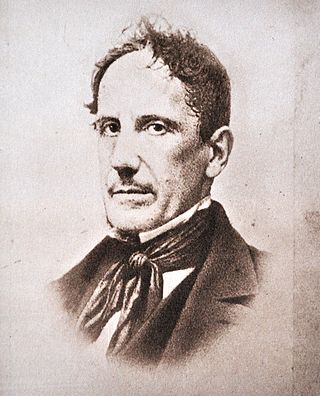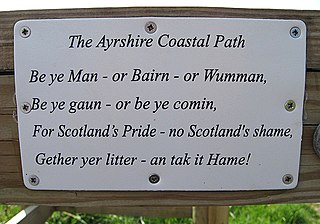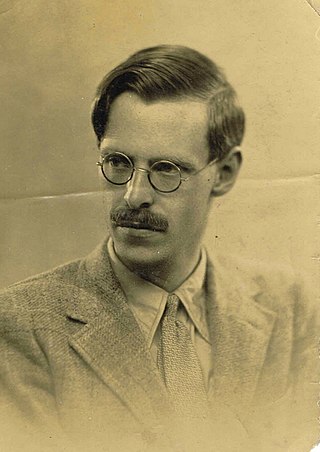Related Research Articles

Sorley MacLean was a Scottish Gaelic poet, described by the Scottish Poetry Library as "one of the major Scottish poets of the modern era" because of his "mastery of his chosen medium and his engagement with the European poetic tradition and European politics". Nobel Prize Laureate Seamus Heaney credited MacLean with saving Scottish Gaelic poetry.
Lallans, is a term that was traditionally used to refer to the Scots language as a whole. However, more recent interpretations assume it refers to the dialects of south and central Scotland, while Doric, a term once used to refer to Scots dialects in general, is now generally seen to refer to the Mid Northern Scots dialects spoken in the north-east of Scotland.

Robert Fergusson was a Scottish poet. After formal education at the University of St Andrews, Fergusson led a bohemian life in Edinburgh, the city of his birth, then at the height of intellectual and cultural ferment as part of the Scottish Enlightenment. Many of his extant poems were printed from 1771 onwards in Walter Ruddiman's Weekly Magazine, and a collected works was first published early in 1773. Despite a short life, his career was highly influential, especially through its impact on Robert Burns. He wrote both Scottish English and the Scots language, and it is his vivid and masterly writing in the latter leid for which he is principally acclaimed.

Scottish literature is literature written in Scotland or by Scottish writers. It includes works in English, Scottish Gaelic, Scots, Brythonic, French, Latin, Norn or other languages written within the modern boundaries of Scotland.
The Scottish Renaissance was a mainly literary movement of the early to mid-20th century that can be seen as the Scottish version of modernism. It is sometimes referred to as the Scottish literary renaissance, although its influence went beyond literature into music, visual arts, and politics. The writers and artists of the Scottish Renaissance displayed a profound interest in both modern philosophy and technology, as well as incorporating folk influences, and a strong concern for the fate of Scotland's declining languages.
Sydney Goodsir Smith was a New Zealand-born Scottish poet, artist, dramatist and novelist. He wrote poetry in literary Scots, sometimes referred to as Lallans, and was a major figure of the Scottish Renaissance.

A makar is a term from Scottish literature for a poet or bard, often thought of as a royal court poet.

Giuseppe Francesco Antonio Maria Gioachino Raimondo Belli was an Italian poet, famous for his sonnets in Romanesco, the dialect of Rome.
Tom Scott was a Scottish poet, editor, and prose writer. His writing is closely tied to the New Apocalypse, the New Romantics, and the Scottish Renaissance.
James King Annand MBE was a Scottish poet best known for his children's poems.
Ian Burgham is a poet. He is the son of Lt. Cmdr. Allen Russell Burgham, DSC, MiD, CD. and Jean Wallace. He has lived in New Zealand and Scotland, but currently resides in Canada. He spent his formative years in Kingston, Ontario and graduated from Queen's Universityin 1972. While at Queen's he studied poetry and poetic process with Professor George Whalley, poet, writer and well-known Coleridge scholar. In 1973, Burgham moved to New Zealand where he taught at Wellington College. In 1975 he moved to Scotland to attend Edinburgh University, taking an M. Litt. degree in Blake studies. His thesis, written under the supervision of Professor Michael Phillips, focussed on William Blake's theory of imagination and the origins of Blake's poetry and theories.
Alexander Scott (1920–1989) was a Scottish poet, playwright and scholar born in Aberdeen. He wrote poetry in both Scots and Scottish English as well as plays, literary reviews and critical studies of literature. As a writer, scholar, dramatist, broadcaster, critic and editor, he showed a life-long commitment to Scottish literary culture. He was latterly a tutor and reader of Scottish literature at the University of Glasgow, where he was instrumental in establishing Scotland's first Department of Scottish Literature in the academic year 1971–72.

Modern Scots comprises the varieties of Scots traditionally spoken in Lowland Scotland and parts of Ulster, from 1700.
Marion Emily Angus (1865–1946) was a Scottish poet who wrote in the Scots vernacular or Braid Scots, defined by some as a dialect of English and others as a closely related language. Her prose writings are mainly in standard English. She is seen as a forerunner of a Scottish Renaissance in inter-war poetry – her verse marks a departure from the Lallans tradition of Robert Burns towards that of Hugh MacDiarmid, Violet Jacob and others.

Flora Garry was a Scottish poet who mostly wrote in the Scots dialect of Aberdeenshire. Well known for her poetry, she played an important role along with Charles Murray and John C. Milne in validating the literary use of Scots.

Poetry of Scotland includes all forms of verse written in Brythonic, Latin, Scottish Gaelic, Scots, French, English and Esperanto and any language in which poetry has been written within the boundaries of modern Scotland, or by Scottish people.

Literature in modern Scotland is literature written in Scotland, or by Scottish writers, since the beginning of the twentieth century. It includes literature written in English, Scottish Gaelic and Scots in forms including poetry, novels, drama and the short story.

Scots-language literature is literature, including poetry, prose and drama, written in the Scots language in its many forms and derivatives. Middle Scots became the dominant language of Scotland in the late Middle Ages. The first surviving major text in Scots literature is John Barbour's Brus (1375). Some ballads may date back to the thirteenth century, but were not recorded until the eighteenth century. In the early fifteenth century Scots historical works included Andrew of Wyntoun's verse Orygynale Cronykil of Scotland and Blind Harry's The Wallace. Much Middle Scots literature was produced by makars, poets with links to the royal court, which included James I, who wrote the extended poem The Kingis Quair. Writers such as William Dunbar, Robert Henryson, Walter Kennedy and Gavin Douglas have been seen as creating a golden age in Scottish poetry. In the late fifteenth century, Scots prose also began to develop as a genre. The first complete surviving work is John Ireland's The Meroure of Wyssdome (1490). There were also prose translations of French books of chivalry that survive from the 1450s. The landmark work in the reign of James IV was Gavin Douglas's version of Virgil's Aeneid.

Robert Crombie Saunders was a poet, editor, journalist and teacher, and a significant figure in the Scottish Renaissance of the 20th century. His poetry is in both English and Scots, and he identified with the 'Lallans' movement, which sought to revive Scots as a serious literary medium.
Dr. David Purves was a Scottish environmental scientist, playwright and poet, and a champion of the Scots language.
References
- Fulton, Robin (1986). A Garioch Miscellany. Edinburgh, MacDonald. ISBN 0-86334-057-1
- Lindsay, Maurice (ed.) (1979), As I Remember: Ten Scottish Authors recall How Writing began for Them. London, Robert Hale, ISBN 0-7091-7321-0.